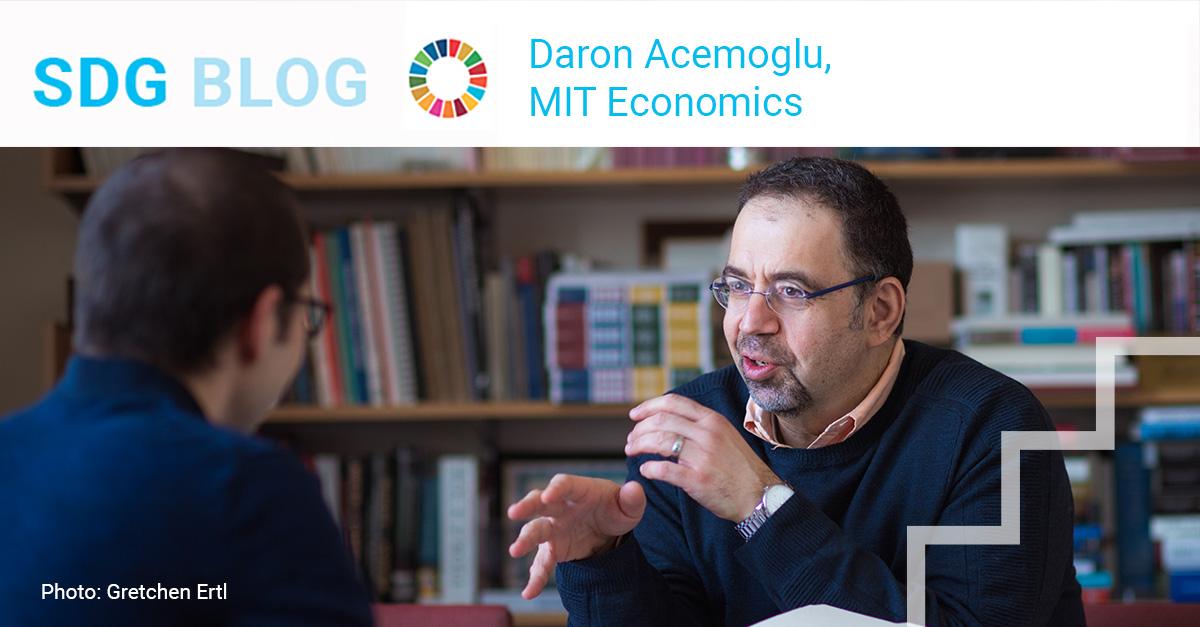SDG Blog

We need a green revolution for technology
By Daron Acemoglu, MIT Economics
Automation and AI (artificial intelligence) are fundamentally reshaping our labour markets, yet they are often seen as problems of developed economies of the West. That is a mistake.
By allowing machines and algorithms to take over tasks previously performed by humans, these new technologies have reduced the labour share of income, negatively impacted employment and significantly increased inequality in many industrialized economies. But automation and AI are also impacting labour markets in emerging economies and will have a transformative effect in the decades to come.
When companies in the US or Germany introduce new robots, it does not only impact their own workers. Sometimes, it enables them to inexpensively produce parts that were previously imported from or offshored to developing economies. Recent research found that robot adoption in the US has negatively affected Mexican firms supplying the US market.
This impact will multiply with the spread of AI, which has started accelerating in the last five years. Although these technologies are touted as revolutionary and broadly beneficial, their effects on the developing world will most likely be very negative.
Almost all examples of rapid growth in the emerging world have come from countries utilizing their human resources effectively — often by exporting labour-intensive products manufactured cheaply and then moving up the value chain. In the age of AI, this will no longer be possible as workers in developing economies will be directly or indirectly competing against robots and algorithms in the industrialized world.
For much of the world, automation and AI are examples of inappropriate technology: they are developed in advanced economies to save on expensive labour by substituting it for machines and algorithms. But labour is precisely what the developing world is rich in.
The appropriate technology for countries such as Indonesia, India or Brazil would be one that makes their workers from diverse backgrounds — including those with limited formal schooling — more productive. Yet the current path of new technology, driven by tech giants in the West, strives to eliminate workers, not to complement them.
That path is not inevitable. As a broad technological platform, AI can be used to create new tasks for workers and increase their productivity in a range of activities. Even in periods of rapid automation, there are plenty of opportunities for using technologies to help workers and turn a profit.
Redirecting AI would generate major benefits for Western workers, who have seen their labour market fortunes tumble over the last four decades. But the real beneficiaries of such a change would be workers in the developing world.
The problem is that when tech giants determine the direction of AI research, workers in developing economies are not usually among their top priorities. This must change. But how?
The most important correction would be to include more voices when it comes to the future direction of digital technologies, especially AI. That means going beyond the current crop of experts and Big Tech executives and scientists, to include workers from industrialized and from developing economies.
Democratic politics may ultimately make it impossible for the tech industry to ignore the voices of Western workers. But the much more numerous workers of the rest of the world will probably remain unheard. They need to coordinate and have a say in what is, incipiently, shaping their future as well. This is where organizations such as the UN could and should play a leading role. They can inform, coordinate and represent the workers of the world.
It is a tall order, but not an impossible one. We already saw it happen seven decades ago with agricultural technology. At the time, Western companies and governments were investing in hybrid varieties of seeds that were not appropriate for the geographic conditions of the developing world. This void was filled by the developing nations themselves who spearheaded the Green Revolution, reshaping agriculture and helping lift millions from poverty in many developing economies, most notably in Brazil, India and Mexico.
The Green Revolution benefited from the support of philanthropic organizations, such as the Rockefeller and Ford Foundations, and efforts by some Western researchers, including Norman Borlaug who was awarded the Nobel Peace Prize for his contributions to this effort. But ultimately, it was researchers in the developing world and a consortium of developing nations, who were at the forefront of understanding and inventing the technologies appropriate for their needs.
What the world was able to achieve for agriculture starting seven decades ago, we must try to achieve again today in the field of AI and digital technologies, even if the odds are stacked in favour of tech companies and against the workers of the world.
* The views expressed in this blog are the author’s and do not necessarily reflect the opinion of UN DESA.
 Welcome to the United Nations
Welcome to the United Nations